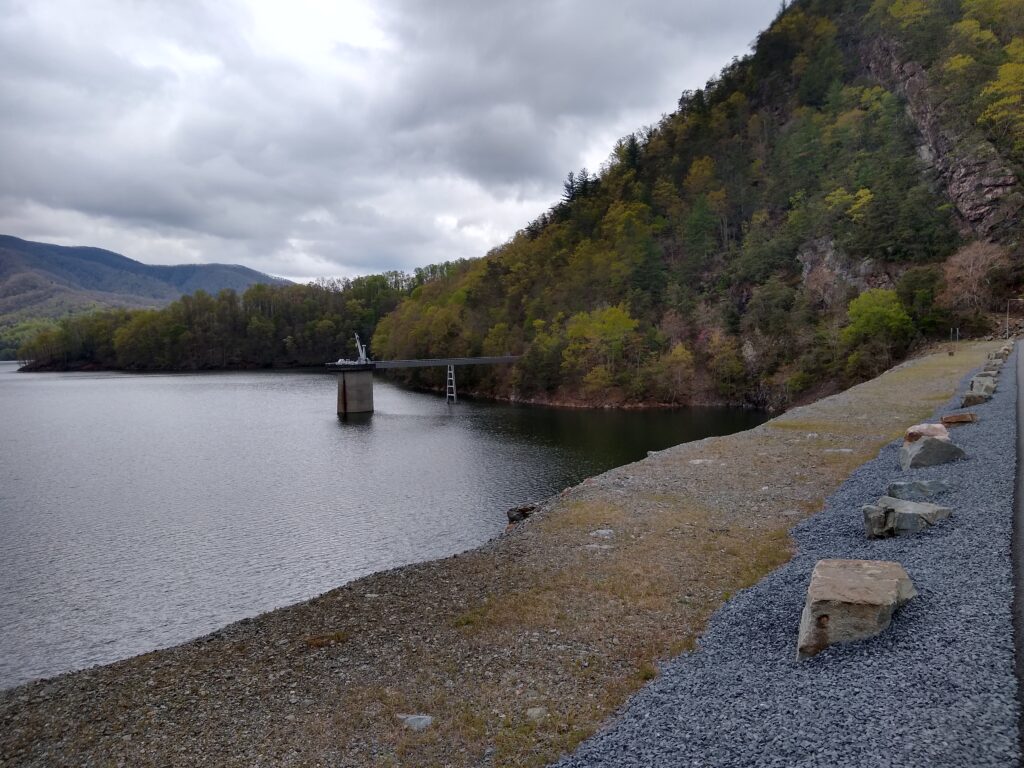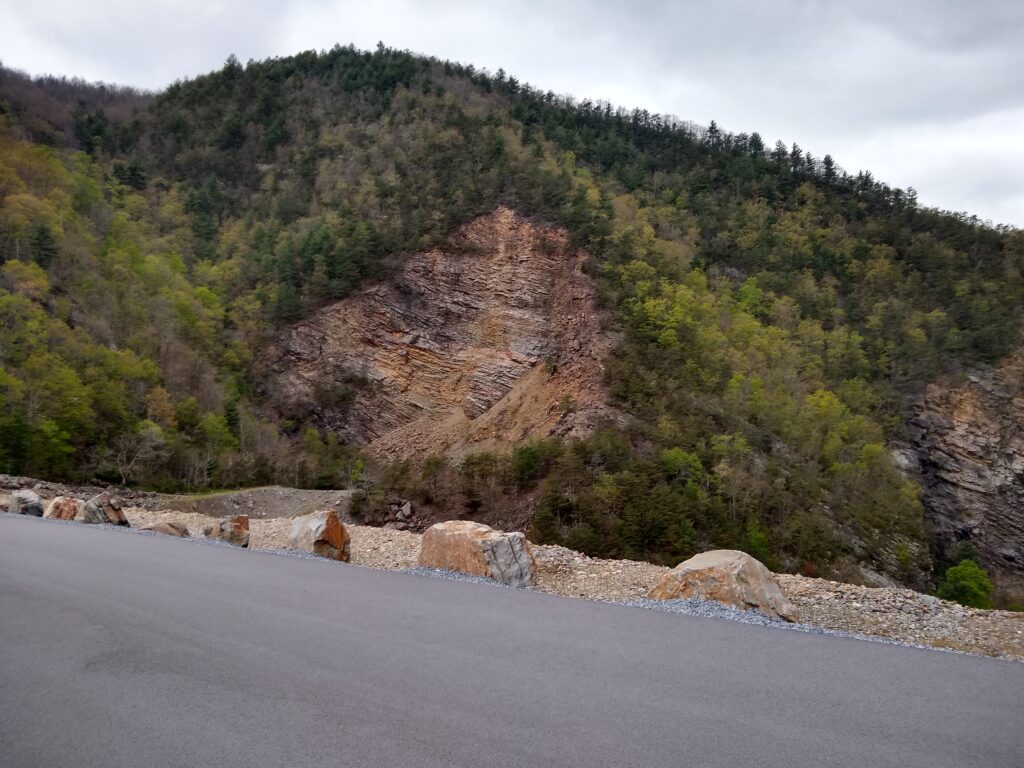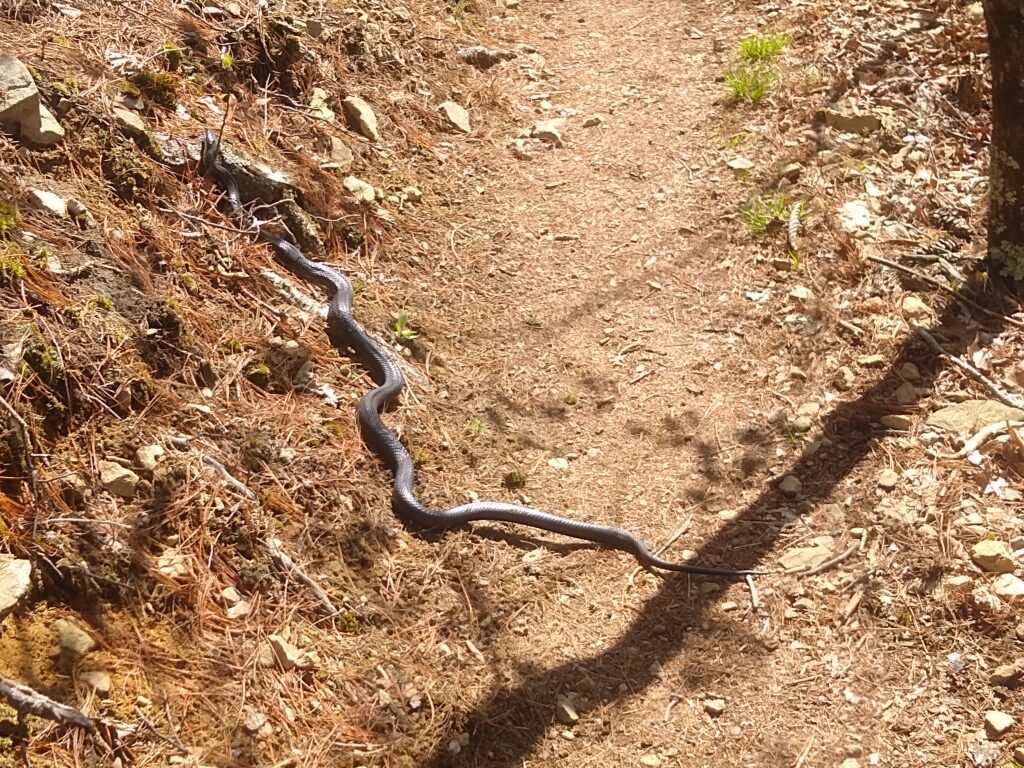- Miles 428.4-441.5 (13.1 mi.)
- Total ascent: 4790’; descent 2920’
The highlight of today is also the reason I write this with a headlight: Rachel and I spent more than an hour checking in with each of our families.
It would be unfair of me to recount their news publicly, but I’ll say that everyone seemed happy, and happy to hear from us. We walked the trail north around Lake Watauga for our conversation with Rebecca. Winded, we sat on an old, concrete foundation just above Watauga Dam while talking to my mother, Andy, and Tom. I also called my friend Will, who must have called back sometime later, but wasn’t able to reach him until the next day.
One topic I mentioned to them, and would like to discuss here, is the amount of ruins we’ve seen recently. Foundations and chimneys that looked like they were once attached to log cabins have become increasingly common sites since the Smokies. South of Boots Off, we found all sorts of broken glass and asphalt from a hotel that evidently burned in the ‘50s. We’ve seen dilapidated barns; century-old logging equipment; rusty oil drums; bullet-riddled, bulbous vehicle fenders, and more.
We’ve also seen a good number of grave sites that suggest the areas through which we’re hiking were populated from the early 19th through the mid-20th centuries. Some burial sites have just one tombstone; others seem to have been family plots; one, Isaac Cemetery, is active and seems to belong to a small, mountainside church.
Although I hear the purists who want a nature-only experience, I find the ruins enriching. The cabin foundations and rusty, two-person saws help me picture what, and who, once lived here. They speak to the ruggedness and perseverance of the people who survived before grocery stores or, in many cases, even roads were here.
Another argument for the presence of these ruins is practical: Removing them would be difficult and, in some cases, more disruptive to the landscape than letting them be. Moving the grave sites would be disrespectful, if even legal.
To me, seeing these artifacts return to nature is both sad and gratifying. A good example is the old logging roads that cross, become, and then separate again from the trail in so many places. Their closure represents not just the end of extractive industry here, but also of one path to opportunity for the economically disadvantaged peoples here.
In some ways, outdoor tourism is the best outcome for these mountains. They’ve witnessed clear cutting of ancient forests, mountaintop removal for sake of mining precious metals, and the American Revolutionary and Civil Wars. I write this post in Cherokee National Forest, most or all of which was Cherokee-settled land before the tribe was “resettled” to Oklahoma.
Before I get too worked up, I want to share a few, more secretarial notes on today.
Water was scarce: We found a stream at 7 miles and another around 11 miles in. We carried full water loads from each, which, together with our four-day food load, had us puffing up those hills (of which there were many — check our total ascent).
We did see Cindy and Suzanne, but we were only able to wave to them while on the phone. We suspect they are now staying at the shelter a few miles behind us and will catch up in the morning. We also saw Poncho, whose ankle seems to be doing much better, at camp.
At dinner, we missed our olive oil and block parmesan, both of which add hundreds of calories to our meal. We also worried about going without Breakfast Essentials, without which we should probably be taking a multivitamin. Our imitation beef bullion cubes taste like dog food, to be frank.
It’s almost 10 o’clock, hours past hiker midnight, so I’ll put down the pen. I look forward to another apples-and-currants instant oatmeal in the morning, another call or two back home in the afternoon, and a flatter, more spacious tent site at which to spend the night.


